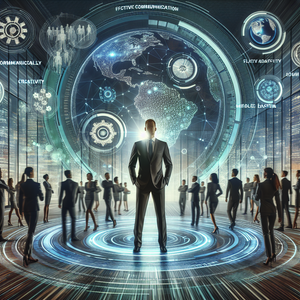
Evolving Leadership Roles and Skills for a Rapidly Changing World
In an era defined by rapid technological progress, shifting market landscapes, and evolving workplace dynamics, leadership has become more multifaceted than ever. Gone are the days when management was solely about supervising teams and driving results. Today, effective leadership requires an intricate mix of strategic foresight, emotional intelligence, adaptability, and the ability to embrace change fearlessly. Modern leaders are tasked with not just keeping pace but staying ahead of the curve. Whether it's guiding organizations through digital transformation, fostering global collaboration, or inspiring innovation, leadership demands have grown exponentially. In this article, we’ll delve into 10 emerging leadership roles that reflect the demands of this new reality. For each role, we’ll explore responsibilities, required skills, and why these positions are crucial in today’s world. Whether you're looking to refine your leadership approach or step into one of these roles, this guide is your roadmap to success in a rapidly evolving world.
Job Summaries:
Chief Change Management Officer (CCMO): The Architect of Transformation:
- The CCMO ensures seamless transitions during organizational changes.
- Responsibilities include designing and executing change management strategies.
- Responsibilities also include aligning transformation initiatives and managing risks.
- Qualifications include expertise in organizational development.
- Certifications like Prosci Change Management are essential.
- Advanced education in business or organizational psychology is required.
- Organizations with strong change management frameworks are 3.5 times more likely to meet project objectives.
Visionary Leadership Consultant: The Futurist Navigator:
- Visionary Leadership Consultants help organizations anticipate industry trends and craft innovative strategies.
- Their responsibilities encompass market analysis, long-term strategy development, and executive coaching in forward-thinking practices.
- Qualifications include an MBA or advanced degree in strategy, experience in consulting, and expertise in scenario planning.
- This role is essential as forward-looking strategies enable companies to outperform competitors in revenue growth.
Global Leadership Strategist: The Cultural Bridge-Builder:
- Global Leadership Strategists navigate the complexities of multinational operations by fostering cross-border collaboration and cultural intelligence.
- Responsibilities include creating expansion strategies, promoting diversity, and managing international compliance.
- Required qualifications include experience in international business, multilingual proficiency, and advanced degrees in global business.
- This role is crucial as globalization demands seamless operations across diverse markets.
Digital Transformation Leader: The Tech Trailblazer:
- Digital Transformation Leaders guide organizations in adopting cutting-edge technologies to drive growth and efficiency.
- Key responsibilities include leading digital platform implementation, training teams, and aligning technology with business goals.
- Qualifications include certifications in digital project management, expertise in IT integration, and knowledge of emerging technologies.
- This role is vital as the digital economy's growth necessitates technological adaptation for competitiveness.
Emotional Intelligence (EI) Coach: The People Whisperer:
- Emotional Intelligence Coaches enhance workplace relationships and leadership resilience.
- Their duties include conducting EI workshops, providing one-on-one coaching, and fostering team cohesion.
- Qualifications involve a background in psychology, certifications in EQ tools, and organizational behavior expertise.
- This role is significant as emotional intelligence drives employee satisfaction, retention, and organizational culture.
Adaptive Leadership Advisor: The Resilience Builder:
- Adaptive Leadership Advisors help organizations build resilience in volatile environments.
- Responsibilities include assessing adaptability, coaching leaders on decision-making, and developing systems for complex challenges.
- Qualifications include expertise in change management and strategic thinking.
- This role is critical as adaptability is a defining trait of successful organizations.
Leadership Development Program Manager: The Talent Catalyst:
- Leadership Development Program Managers focus on nurturing future leaders by designing training programs, measuring effectiveness, and managing mentorship initiatives.
- Qualifications include a background in HR or talent development, expertise in curriculum design, and leadership coaching.
- This role is essential for future-proofing talent pipelines.
Remote Team Leadership Consultant: The Virtual Engagement Expert:
- Remote Team Leadership Consultants specialize in managing geographically dispersed teams.
- Responsibilities include developing virtual collaboration strategies, enhancing remote engagement, and training leaders for hybrid dynamics.
- Qualifications include proficiency in remote work tools and virtual communication strategies.
- This role is vital as remote work becomes the norm.
The evolving landscape of leadership demands more than traditional skills. Whether you aspire to drive digital transformation, foster global collaboration, or coach leaders in emotional intelligence, the opportunities are immense. By honing the required skills, pursuing relevant certifications, and embracing a mindset of adaptability, you can position yourself as a leader equipped to thrive in this complex world. The future of leadership isn’t coming—it’s already here. The question is, will you rise to meet it?
Explore More Jobs

